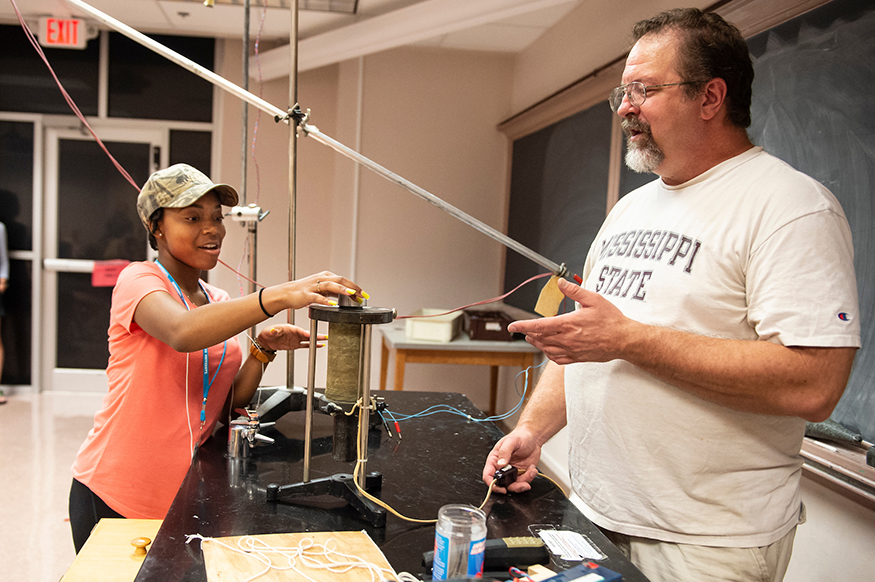Students in AP preparatory program show dramatic progress

Students from seven rural Mississippi school districts who attended a July 2018 residential AP Physics preparatory program conducted by Mississippi State University (MSU) and the Global Teaching Project achieved dramatic gains in substantive understanding of course content, according to nationally recognized pre- and post-program assessments utilized by the American Association of Physics Teachers (AAPT).
For the second year, MSU and the Global Teaching Project conducted a summer preparatory program focusing on students who demonstrate the potential for high academic achievement. The summer program is part of a pilot program implemented by the Global Teaching Project to provide promising students in rural and low-income school districts access to the rigorous courses they need to achieve their full potential, but who attend schools that do not offer such courses, often due to a chronic shortage of qualified teachers in advanced secondary courses, particularly STEM.
Students from 10 Mississippi high schools participated in the program in 2017-2018, increasing the number of public schools in the state offering AP Physics 1 by 30 percent from the prior year. The program is growing in 2018-2019 to include additional schools.
A total of 33 students from Aberdeen, Booneville, Coahoma AHS, Holmes County, Lauderdale County, Quitman County, and Scott County School Districts attended the two-week summer program. The students received immersive instruction in math and physics to prepare them to take an AP Physics 1 course being implemented in the 2018-2019 academic year at their schools and in other participating Mississippi school districts.
Each of the participating students was identified by their schools as having the aptitude and work ethic needed to succeed in the AP Physics course. Nonetheless, the students often had gaps in their academic foundation; the summer program sought to mitigate those gaps prior to commencement of the course.
The median assessment score for students at the outset of the summer program was 20.0 on a scale of 100, lower than the mean pretest score of approximately 34 for a broad sample of high school students commencing a first-year Honors Physics course. Successful students at the end of a year-long course will approach, but very rarely achieve, a score of 100. However, the median assessment for students at the end of the summer program more than doubled, to 43.3.
In short, students at the outset of the summer program were, on average, less prepared than most high school students commencing a rigorous first-year Physics course. At the end of the program, the summer program participants were more prepared than most other such students.
“The assessment results emphatically affirm the premise of the pilot program—that a well-designed academic program can dramatically increase students’ mathematics and physics knowledge,” said Devon Brenner, Mississippi State education professor and special assistant to the vice president for education initiatives.
Matt Dolan, CEO of the Global Teaching Project, added, “There are potentially high-achieving students everywhere, who, if provided quality instruction and sufficient academic supports, can excel academically regardless of their circumstances. We look forward to building on our success in the summer program during the school year with these and other students in our AP curriculum.”
Anna Creekmore and Dane Peagler, both MSU College of Education alumni and high school science teachers in north Mississippi, led instruction in the summer program. Lizzie Brandon, also an MSU alumna and local high school science teacher, served as the program coordinator.
The testing metric used, the Force Concept Inventory (FCI), is an assessment developed by a team of prominent physics instructors and administered under the auspices of the AAPT. The FCI is used to “assess students’ understanding of the most basic concepts in Newtonian Physics,” with a focus on mechanics content knowledge, particularly forces and kinematics. The level of the exam is introductory college or advanced high school. AAPT-verified Physics instructors may upload student answers to the FCI assessment to AAPT data bases and receive detailed reports analyzing assessment outcomes. The FCI assessment is widely administered at the beginning and end of Physics courses to gauge student learning.
For more on the Global Teaching Project and the pilot program in Mississippi, visit www.globalteachingproject.com and www.educationaccessms.org.